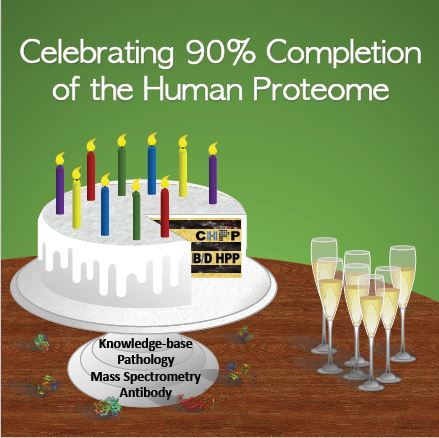
In the midst of a pandemic, in the midst of the global effort to develop effective vaccines and anti-virals for SARS-CoV-2—yet, paradoxically, also in the midst of a surreal moment in history where the very science that can save millions is assailed if the facts and truth conflict with political mantra—we nonetheless can celebrate. Reminding us all of the importance and relevance of science, today, October 19, 2020, we celebrate the announcement of the draft human proteome in the opening talk at HUPO CONNECT by the First Chair of the Human Proteome Project (HPP), Dr Gil Omenn, with a virtual issue of the Journal of Proteome Research (https://pubs.acs.org/page/jprobs/vi/humanproteome). In the virtual issue the editors have compiled 60 of the most significant papers published in the Journal over the past decade on the human proteome project reflecting the diversity of the C-HPP and B/D-HPP teams, regions, approaches, impact and achievement.
The neXtProt database posted the landmark human proteome data release covering 90% of the human proteome on 17th January, 20201, which is now reported by the HPP Consortium in Nature Communications by Adhikari et al 20202. In the companion annual human proteome metrics paper by Gil Omenn et al 20203 reporting this year’s progress of the HPP, the underlying data is presented in depth. The metrics paper will be published in the 8th Special Issue of the Journal of Proteome Research dedicated to the HPP in December 2020, with the ASAP preprint online today leading this HPP Virtual Issue and with a commentary editorial by Chris Overall4.
The human proteome was identified by HPP global research teams and scientists from the wider scientific community and assembled by the Chromosome Centric-HPP (C-HPP) and the HPP Knowledgebase Pillar data curators from neXtProt PeptideAtlas, and MassIVE. The C-HPP was established in 2010 as the major initiative of the HPP to identify at least one protein form (proteoform) from each of the protein-encoding genes in the human genome. For the next high-fidelity compendium of the full human proteome and to develop a broader understanding of life, human conscience, and disease, proteomics needs more data, more patients, more scientists, and more doctors to understand life, individuality, personality and disease—science needs us all, but now, more than ever, humanity needs more science
1. https://www.nextprot.org/about/statistics
2. Subash Adhikari, Edouard Nice, Eric Deutsch, Lydie Lane, Gilbert Omenn, Steve Pennington, Young-ki Paik, Christopher Overall, Fernando Corrales, Ileana Cristea, Jennifer Van Eyk, Mathias Uhlen, Cecilia Lindskog, Daniel Chan, Amos Bairoch, James Waddington, Joshua Justice, Joshua LaBaer, Henry Rodriguez, Fuchu He, Markus Kostrzewa, Peipei Ping, Rebekah Gundry, Peter Stewart, Sanjeeva Srivastava, Sudhir Srivastava, Fabio Nogueira, Gilberto Domont, Yves Vandenbrouck, Maggie Lam, Sara Wennersten, Juan Antonio Vizcaino, Marc Wilkins, Jochen Schwenk, Emma Lundberg, Nuno Bandeira, György Marko-Varga, Susan Weintraub, Charles Pineau, Ulrike Kusebauch, Robert Moritz, Seong Beom Ahn, Magnas Palmblad, Michael Snyder, Ruedi Aebersold, and Mark Baker. A High-Stringency Blueprint of the Human Proteome, Nat. Communications, 2020, doi.org/10.1038/s41467-020-19045-9.
3. Omenn G. S.; Lane L.; Overall C. M.; Cristea I. M.; Corrales F. J.; Lindskog C.; Paik Y-K.; Van Eyk J. E.; Liu S.; Pennington S.; Snyder M.P.; Baker M.; Bandeira N.; Aebersold, R.; Moritz, R.L.; Deutsch EW. Research on The Human Proteome Reaches a Major Milestone: >90% of Predicted Human Proteins Now Credibly Detected, According to the HUPO Human Proteome Project. J Proteome Res. 2020, Sep 15. doi: 10.1021/acs.jproteome.0c00485.
4. Overall, C.M. J Proteome Res. 2020, October 19. The HUPO High-Stringency Inventory of Humanity’s Shared Human Proteome Revealed. https://pubs.acs.org/doi/full/10.1021/acs.jproteome.0c00794.


.png)